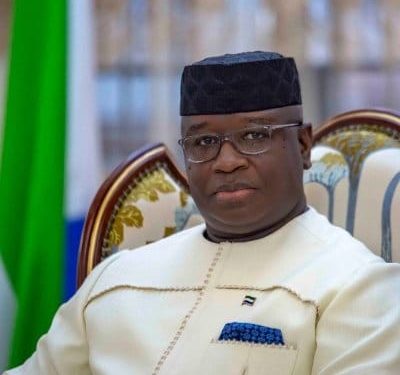President Julius Maada Bio has left Freetown for Bissau, the capital of Guinea Bissau, in his first foreign trip since his re-election in last month’s disputed polls.
Bio will join fellow leaders in Bissau, which is hosting the 63rd Ordinary Session of the Heads of States and Governments of the Economic Community of West African States (ECOWAS).
President Bio left Freetown on Saturday, ahead of commencement of the summit slated for Sunday, July 9, according to a short statement by State House Press Secretary Yusuf Keketoma Sandi, as published on his personal facebook page.
According to the ECOWAS Commission, on the agenda for consideration by the leaders are issues threatening sub-regional peace and security. Specifically, the heads of state will discuss the Report of the 50th Ordinary Session of the Mediation and Security Council (MSC) and the report of the 90th Ordinary Session of ECOWAS Council of Ministers on the financial situation of the bloc, both of which were held from July 6 to 7 in Bissau.
The West African leaders will also discuss a report on the status of the transitions in Mali, Burkina Faso and Guinea, three of its member countries currently under military rule. They will also look at the implementation of the African Continental Free Trade Area agreement, as well as the much delayed ECOWAS Single Currency.
ECOWAS is among a few countries and international organizations that have recognized Bio’s re-election, despite the refusal of the opposition to accept the outcome.
Another leader who will be in Bissau with a question mark on the legitimacy of his mandate is Nigeria’s Bola Ahmad Tinubu.
The Tinubu presidency last week dismissed a report by the European Elections Union Observation Mission which questioned the integrity of the poll, blaming lack of public trust on the Independent National Electoral Commission on deficiencies in the country’s electoral and legal infrastructure.
But unlike in Nigeria, where the two top opposition parties are challenging Tinubu’s win in court, the main opposition All People’s Congress in Sierra Leone says it doesn’t trust the justice system. It has therefore decided to boycott the governance process, a decision that is likely to add to ECOWAS’ inundated in-tray of political crises.
The bloc is already under pressure to act against undemocratic culture by elected leaders, which has been blamed for the resurgence of military coups in the region, as witnessed in Mali, Guinea and Burkina Faso, as well as reported attempted coups in Guinea Bissau and Gambia.
Reports indicate that the host President Umaro Sissoco Embalo of Guinea Bissau intends to extend his term as ECOWAS chairman for one more year, but other candidates are said to be eying the position, among President Tinubu.
Nigeria is a major funder of ECOWAS.






















